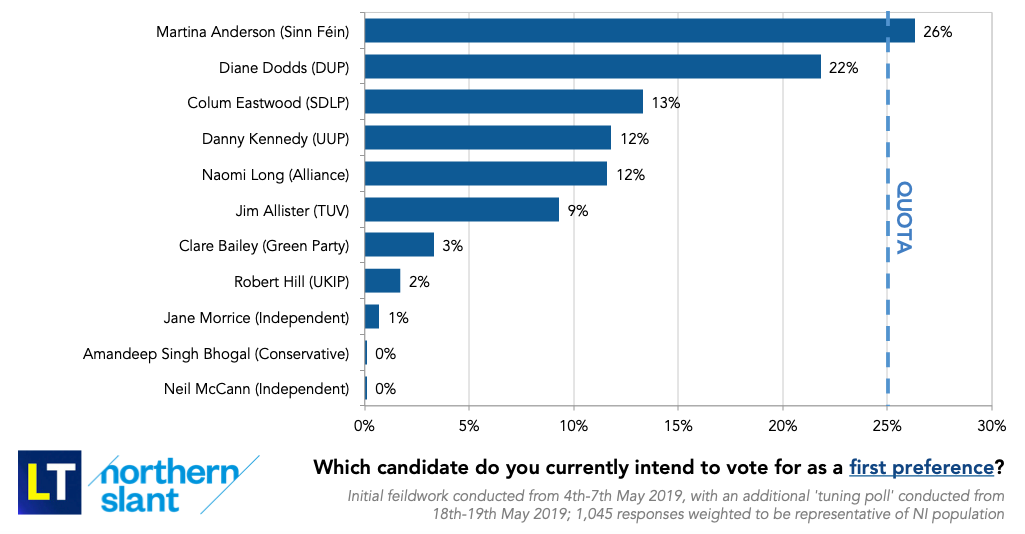Two weeks ago, LucidTalk conducted the first Northern Ireland poll of the European election campaign (data collected between 4thand 7thMay). It showed that Naomi Long was well placed to take Northern Ireland’s third European Parliament seat, but she was caught in a three-way race with the UUP’s Danny Kennedy and the SDLP’s Colum Eastwood.
The results of a second ‘tuning’ poll, conducted between the 18thand 19thMay, give us a further idea of the direction of travel. It has been a short election campaign, truncated by the local elections and the possibility that these elections would never take place. Nevertheless, parties and candidates have worked hard to appeal to voters right across Northern Ireland and will be keen to see whether their campaigns have changed hearts and minds. Please note that both polls have a margin of error of +/-2.6%.
In terms of candidates gaining support, the DUP’s Diane Dodds has seen a rise in support of 1.6 points, bringing her to 21.8% of intended first preferences – just 3.2% shy of the quota. The SDLP’s Colum Eastwood, Alliance’s Naomi Long and the TUV’s Jim Allister have also seen marginal gains during the campaign – Eastwood is up 0.2 points, Long is up 0.3 points and Allister is up 0.8 points.
On the other hand, Sinn Féin’s Martina Anderson and Independent Jane Morrice have lost 0.7 points and 0.9 points respectively, whilst support for the Green Party’s Clare Bailey has dropped from 4.6% to 3.3% – a loss of 1.3 points over the last fortnight.
Independent Neil McCann, the Conservatives’ Amandeep Singh Bhogal, UKIP’s Robert Hill and the UUP’s Danny Kennedy appear to have seen no change in their first preference support whatsoever, despite two weeks of campaigning.
The implications of these updated polling insights are twofold.
Firstly, both polls suggest that Martina Anderson will likely garner enough votes to get elected on first preferences alone – as she did in 2014. Diane Dodds will be just shy of the quota and will likely have to wait until Jim Allister is eliminated in order to be deemed elected. These likely outcomes, combined with Danny Kennedy’s stagnant support and Naomi Long’s ability to attract transfer votes, emphasises how much of an uphill struggle Kennedy will then face to keep the third seat. That said, the rise in support for Dodds and Allister, a combined increase of 1.5 points, may well help Kennedy at the crucial stage when DUP transfers are allocated. Conversely, the fall in support for Morrice, Bailey and Anderson, a combined decrease of 2.9 points, could have implications for Long and Eastwood at that same, crucial stage, making for a very close set of stages at the count.
The second implication is that undecided voters will play a key role in the eventual outcome of this election. Across the two polls, the number of undecided voters fell from 6.7% to 3.2% – a drop that may go some way towards explaining the relative gains and losses in support revealed in the second poll. Yet with 3.2% of voters still undecided, debates such as last night’s BBC Spotlight special could be instrumental in determining which candidates these voters support on Election Day – and in which order of preference.
Helpfully, LucidTalk have also conducted a post-programme poll overnight. This asked respondents who they thought ‘won’ the debate – and how they rated each candidate’s performance. 23% thought Colum Eastwood won the and 21% thought Naomi Long did – with Allister, Dodds and Anderson coming in at 19%, 14% and 15% respectively. Danny Kennedy, meanwhile, came in last, with just 8% thinking he won.
Kennedy also came last in terms of performance evaluation, with just 10% saying his performance was ‘excellent’ and 18% saying it was ‘good’. For Colum Eastwood and Naomi Long these figures were reversed, with 20% rating Eastwood as ‘excellent’ and 39% rating him as ‘good’, and 22% rating Long as ‘excellent’ and 43% rating her as ‘good;. In a crucial debate where the votes and transfers of undecided voters may have been decided, Kennedy seems to have struggled – and that could well cost him when the ballot papers are counted on Monday.
What all of this tells us is that tomorrow’s election will likely be the closest European election in years in Northern Ireland. With undecided voters yet to make up their minds and small shifts in support proving crucial in later stages of the count, it really is too close to call. Both Colum Eastwood and Naomi Long appear to have performed well – both last night’s post-programme poll and the tuning poll indicate this – but will the transfers be there when they need them? We’ll have to wait until Monday to find out.
One thing is for certain – every vote really will make a difference this time.
Methodology, and more on LucidTalk
The polling referenced in this article was carried out by Belfast based polling and market research company LucidTalk. The initial poll was carried out online over a period of four days from 4th to 7th May 2019. The project targeted the established LucidTalk NI-Wide Opinion Panel (12,047 members) which is balanced by gender, age-group, area of residence, and community background, in order to be demographically representative of Northern Ireland (NI). It was supplemented by a ‘tuning poll’ conducted from 18th-19th May 2019. 1,405 full responses were considered in terms of the final results, and a data auditing process ensured all completed poll-surveys were genuine ‘one-person, one-vote’ responses, and also to ensure a robust NI representative sample of opinion. This weighted dataset was/is a demographically representative sample of Northern Ireland – producing results representative of NI Opinion to within an error of +/-2.6%.

